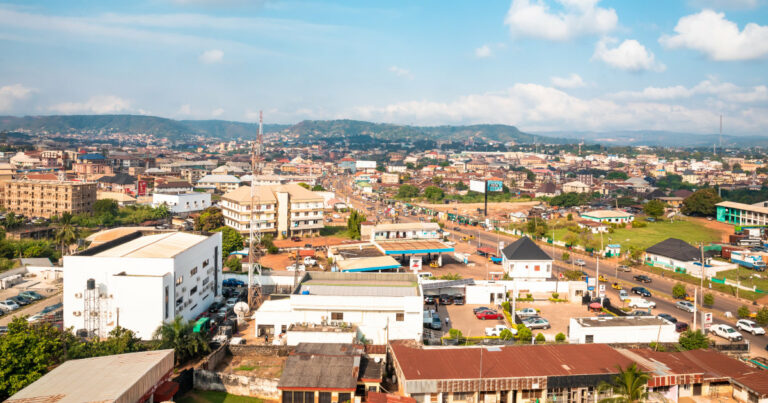Top 10 Largest Towns And Cities In Akwa-Ibom State
Looking for a list of the top largest towns and cities in Akwa-Ibom state? This article provides detailed information on all you need to know concerning that.
Why Akwa-Ibom State?
As we rightly discussed on both our lists of the top 10 most developed and top ten most beautiful states in Nigeria, it is also important to highlight the beautiful, developed, and largest towns and cities in this state for the benefit of those who are willing to either move to this state or go on a long vacation to this state.
About Akwa-Ibom State
Akwa-Ibom state is a south-southern state in Nigeria, comprising mostly of people who speak Igbo language, one of the native languages in Nigeria. In other words, Akwa-Ibom is an Igbo-speaking state in Nigeria. In some sections of the state, Akwa-Ibom boasts of tremendous infrastructure development.
With Uyo as its capital, Akwa-Ibom appears to be one of Nigeria’s wealthiest states, with oil accounting for the majority of its Internally Generated Revenue. The state of Akwa-Ibom is also home to numerous tourist attractions, including Nigeria’s largest stadium, the Godswill Akpabio International Stadium.
Let’s get right into the topic of the day: the top ten largest towns and cities in Akwa-Ibom State.
Top 10 Largest Towns and Cities in Akwa-Ibom State
With over 80 towns and cities located in Akwa-Ibom State, information regarding the top 10 largest ones would be provided in this article.
Uyo
Uyo is the state capital of Akwa-Ibom. Uyo is a fast-growing city, with massive infrastructure development in the last nine years. It boasts a dense network of divided roads, including the eight-lane Nsikak Eduok Avenue, which is currently the widest road in the Uyo metropolitan. Flyovers are now being built to alleviate traffic congestion.
Some locals have recently ventured into the transportation industry, as well as establishing cottage enterprises for the construction and production of some domestic goods and agricultural tools. They are on the whole, enterprising, innovative, and adventurous people. Uyo people are also property developers and craftspeople. They are also proactive, focused, and enterprising.
The University of Uyo is located in Uyo. Uyo is home to several notable housing districts, including the Ewet Housing Estate, Shelter Afrique, and other estates located throughout the city, as well as private estates and other residential districts. The Itam Industrial Estate is one of the city’s two major industrial estates.
The city of Uyo is particularly clean and welcoming to visitors and aborigines. The famous Ewet Housing Estate, Shelter Afrique, and a slew of other upscale neighborhoods in Uyo and its environs are just a few examples. Within the metropolis, the state government intends to build newer residential districts as well as a central business center.
Ikot Ekpene
Ikot Ekpene, popularly known as The Raffia City, is a historic town in the state of Akwa-Ibom in Nigeria’s south-central region. It is the Annang ethnic group’s political and cultural capital in Nigeria.
Ikot Ekpene is a regional trade hub, with substantial exports of palm products such as oil and kernels, raffia products such as fibers and wine, and ground crops such as yams, cassava, taro, and corn.
The Annang people make up the majority of the population, with a few Igbo traders and Hausa Suya vendors. Basket weaving, sculpting, and, most notably, raffia cane furniture are all important exports (hence the colloquial name of the town).
Ikot Ekpene is now noted for its technological breakthroughs. This is all thanks to the advent of the Raffia City Hub. Raffia City Hub is a diverse technical community that fosters talent acquisition, resource sharing, cooperation, and the growth of early-stage businesses.
Ikot Ekpene is also home to several major seminaries as well as the Catholic Diocese of the South-South. The city is home to prominent landmarks such as the Nteps Supermarkets, GRA road mini stadium, and Four Point by Sheraton hotels, among others.
Eket
Eket is the second-largest city in Nigeria’s Akwa-Ibom State. The term also applies to the region’s indigenous ethnic group and its language, as well as the city itself, which is an industrial city that has grown into a conurbation in recent years, absorbing various villages.
There are privately maintained tourism sites in the local government area. Hotel, gardens, and parks are among them. These factors, among others, have attracted the worldwide oil company ExxonMobil to the area.
There are abundant deposits of crude oil and clay in Eket. Timber and palm products are examples of forest resources. Seafood is also produced in the area, as well as farm crops such as yam, cassava, cocoyam, plantain, maize, and vegetables. Eket people are traditionally fishermen, hunters, farmers, and weavers. Crop and animal farming thrive in the abundant lush vegetation.
Ikot Abasi
Ikot Abasi is home to the Ibibio ethnic community, which has diverse cultural legacies and customs. They communicate in Ibibio. More than 200,000 people live in the Ikot Abasi Local Government Area. It is divided into ten political wards, 75 villages, and five clans. Ikpa Ibekwe, Edemaya, Ukpum Ette, Ukpum Okon, and Ikpa Nnung Assang are the five clans.
Ikot Abasi, often known as “Aluminum City,” is a historical and modern hub of economic and cultural influences. It is the current center of Nigeria’s modern industrial growth. It has served as the headquarters of various local governments during both the colonial and post-independence periods due to its healthy cultural traditions, extensive historical history, and huge economic potential.
Ikot Abasi is both an urban center and an administrative division/local government area in the sense that both components are closely linked.
Read Also: Top Richest Men in Akwa-Ibom (Updates)
Essien Udim
This also appears on our list of the top 10 largest towns and cities in Akwa-Ibom State. The Nigerian state of Abia borders Essien Udim on the north and west, and Ikot Ekpene and Ikono Local Government Areas on the east. Abak, Etim Ekpo, and Ika Local Government Areas border the city on the south.
Ekpo, Esse, Ekong, Asian-Anwan, Ebere, Oko, Abom, Abiakpo, Uta, and other ethnic groups inhabit Essien Udim. All of this, in its own way, demonstrates that Essien Udim is still a tourist destination.
The people of the Essien Udim Local Government Area are primarily engaged in agriculture. Farming seasons are divided into three categories: early, late, and dry. Cassava, maize, yam, cocoyam, water yam, melon, and other major food crops are grown in the region. Fluted pumpkin, Afang, waterleaf, bitter leaf, and other vegetables are grown extensively.
Uruan
Uruan also happens to be among the top largest towns and cities in Akwa-Ibom. With a population of over 180,000 people, the Uruan people have maintained good relations with their neighbors and have adhered tenaciously to their traditions.
Only seven of the Uruan region’s original twelve traditional clans remain today, most of which are practically unrecognized. Others are thought to have settled among the Ibibios. These villages have maintained strong ties with their Uruan kin to this day.
Ibeno
The Ibeno Local Government Area is located at the southernmost point of Akwa-Ibom State, covering nearly 1,200 kilometers of coastline. Ibeno town is one of the main fishing communities on the Nigerian coast, located on the eastern bank of the Kwa Ibo River. The cultural heritage of the Ibeno people is extensive.
The people’s primary occupation is fishing. Agriculture and minor trading, on the other hand, receive favorable attention. Exxon Mobil and other service businesses’ oil exploration efforts have an impact on both upstream and downstream activity.
Abak
Abak is among the top 10 largest towns and cities in Akwa-Ibom State. It covers 304 square kilometers of land. The state capital, Uyo, is around 18 kilometers away from the local government headquarters.
The main source of income for the residents in this area is palm oil. Abak is a shell of its former glory. Before the civil war, Abak was the economic center of erstwhile Southeastern Nigeria.
Palm production is the people’s main source of income. Rich mineral deposits like crude oil, salt, sand, clay, and gravel, are among Abak’s natural resources. It is located in a tropical rainforest that provides an abundance of palm fruits, cassava, and a variety of vegetables.
Oron
Oron is a Nigerian coastal city and Local Government Area in the state of Akwa-Ibom. It has a population of over 200,000 people and covers an area of 70 km2.
It houses the Nigerian Maritime Academy and the Oron Museum. The region is recognized for its geographical Oil Palm Belt, tropical rainforest, wetlands, and beaches, as well as its exceptionally fertile soil.
Timber and raw materials for therapeutic purposes are also available from mangrove forests. Solid minerals, such as iron, free silica, or glass sand and gravel, are also found in the area. Crab, oysters, and periwinkle are only a few of the many kinds of seafood available.
Oil and natural gas are plentiful in Oron. The majority of its oil deposits are offshore, and it has vast natural gas reserves that have yet to be exploited.
Ikono
Ikono completes our list of the top 10 largest towns and cities in Akwa-Ibom State. It covers 407.16 square kilometers of land. It is mostly inhabited by the Ibibios, the state’s main ethnic group. Ikono’s residents are excellent farmers, cultivating both cash and food crops.
Mineral assets like crude petroleum are stored in the Ikono LGA. Cultivating is also an important financial activity in Ikono, with crops filling the space in truly massive numbers. Exchange thrives in Ikono LGA, with the location facilitating a variety of business sectors such as the Obo daily market. Ikono residents also engage in fishing and logging.
Conclusion
This piece has covered all necessary information regarding the top largest towns and cities in Akwa-Ibom State. This is not to say that other towns are not large. They just do not meet up with the above-listed ones.
Thinking of renting a house in Akwa-Ibom State?
See also: Cost of house rent in Uyo, the capital of Akwa Ibom.
If you have questions, please use the comment section below. Thank you.

![Smallest States In Nigeria By Landmass ([year]) Smallest States In Nigeria By Landmass](https://eucarlrealty.com/wp-content/uploads/2023/01/istockphoto-1346306959-612x612-1.webp)
